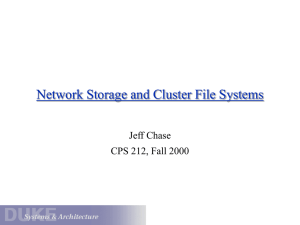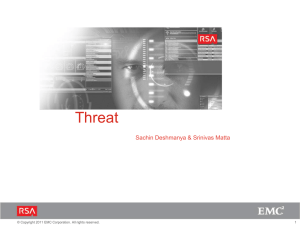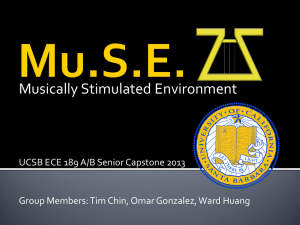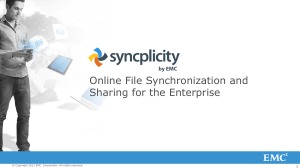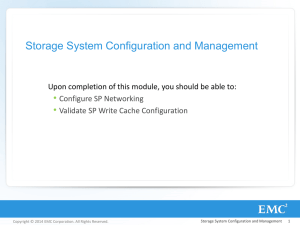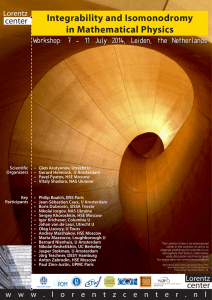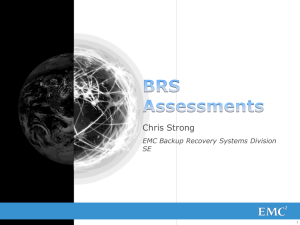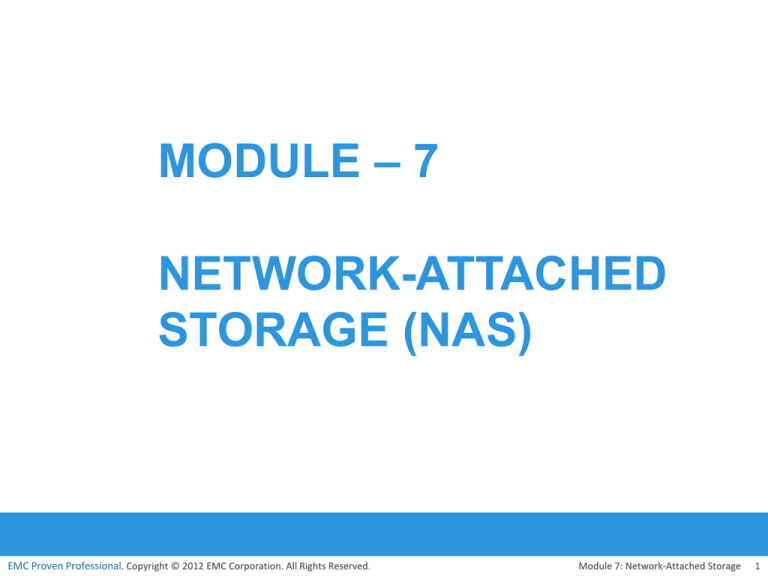
MODULE – 7
NETWORK-ATTACHED
STORAGE (NAS)
EMC Proven Professional. Copyright © 2012 EMC Corporation. All Rights Reserved.
Module 7: Network-Attached Storage
1
Module 7: Network-Attached Storage (NAS)
Upon completion of this module, you should be able to:
• Describe NAS, its benefits, and components
• Discuss NAS file-sharing protocols
• Describe different NAS implementations
• Describe file-level virtualization
EMC Proven Professional. Copyright © 2012 EMC Corporation. All Rights Reserved.
Module 7: Network-Attached Storage
2
Module 7: Network-Attached Storage
(NAS)
Lesson 1: NAS Components and Benefits
During this lesson the following topics are covered:
• File sharing technology evolution
• Benefits of NAS
• NAS components
• NAS file sharing protocols
• NAS I/O operations
EMC Proven Professional. Copyright © 2012 EMC Corporation. All Rights Reserved.
Module 7: Network-Attached Storage
3
File Sharing Environment
• File sharing enables users to share files with other users
• Creator or owner of a file determines the type of access to be
•
•
given to other users
File sharing environment ensures data integrity when multiple
users access a shared file at the same time
Examples of file sharing methods:
File Transfer Protocol (FTP)
Distributed File System (DFS)
Network File System (NFS) and Common Internet File System (CIFS)
Peer-to-Peer (P2P)
EMC Proven Professional. Copyright © 2012 EMC Corporation. All Rights Reserved.
Module 7: Network-Attached Storage
4
File Sharing Technology Evolution
Stand Alone PC
Portable Media
for File Sharing
Networked PCs
File Sharing using File Servers
File
Servers
File Sharing using NAS
NAS
Device
EMC Proven Professional. Copyright © 2012 EMC Corporation. All Rights Reserved.
Module 7: Network-Attached Storage
5
What is NAS?
NAS
It is an IP-based, dedicated, high-performance file sharing and storage device.
• Enables NAS clients to share files over IP network
• Uses specialized operating system that is optimized for file I/O
• Enables both UNIX and Windows users to share data
Clients
LAN
Application
Servers
NAS Device
Print Server
EMC Proven Professional. Copyright © 2012 EMC Corporation. All Rights Reserved.
Module 7: Network-Attached Storage
6
General Purpose Servers Vs. NAS Devices
Applications
File System
Print Drivers
Operating System
File System
Network Interface
Operating System
Network Interface
Single Purpose
NAS Device
General Purpose Servers
(Windows or UNIX)
EMC Proven Professional. Copyright © 2012 EMC Corporation. All Rights Reserved.
Module 7: Network-Attached Storage
7
Benefits of NAS
• Improved efficiency
• Improved flexibility
• Centralized storage
• Simplified management
• Scalability
• High availability – through native clustering and replication
• Security – authentication, authorization, and file locking in
•
•
conjunction with industry-standard security
Low cost
Ease of deployment
EMC Proven Professional. Copyright © 2012 EMC Corporation. All Rights Reserved.
Module 7: Network-Attached Storage
8
Components of NAS
Network Interface
NFS
UNIX Client
NAS Head
NFS
CIFS
IP
NAS Device OS
Storage Interface
CIFS
Windows Client
Storage Array
NAS Device
EMC Proven Professional. Copyright © 2012 EMC Corporation. All Rights Reserved.
Module 7: Network-Attached Storage
9
NAS File Sharing Protocols
• Two common NAS file sharing protocols are:
Common Internet File System (CIFS)
Network File System (NFS)
EMC Proven Professional. Copyright © 2012 EMC Corporation. All Rights Reserved.
Module 7: Network-Attached Storage 10
Common Internet File System
• Client-server application protocol
An open variation of the Server Message Block (SMB) protocol
• Enables clients to access files that are on a server over TCP/IP
• Stateful Protocol
Maintains connection information regarding every connected
client
Can automatically restore connections and reopen files that were
open prior to interruption
EMC Proven Professional. Copyright © 2012 EMC Corporation. All Rights Reserved.
Module 7: Network-Attached Storage 11
Network File System
• Client-server application protocol
• Enables clients to access files that are on a server
• Uses Remote Procedure Call (RPC) mechanism to provide access
•
to remote file system
Currently, three versions of NFS are in use:
NFS v2 is stateless and uses UDP as transport layer protocol
NFS v3 is stateless and uses UDP or optionally TCP as transport
layer protocol
NFS v4 is stateful and uses TCP as transport layer protocol
EMC Proven Professional. Copyright © 2012 EMC Corporation. All Rights Reserved.
Module 7: Network-Attached Storage 12
NAS I/O Operation
2
Application
Storage Interface
Operating System
NAS Operating System
NFS or CIFS
NFS and CIFS
TCP/IP Stack
TCP/IP Stack
Block I/O
Storage Array
1
Network Interface
Network Interface
Client
3
File I/O
4
EMC Proven Professional. Copyright © 2012 EMC Corporation. All Rights Reserved.
NAS Head
Module 7: Network-Attached Storage 13
Module 7: Network-Attached Storage
(NAS)
Lesson 2: NAS Implementation and File-level Virtualization
During this lesson the following topics are covered:
• NAS implementations
• NAS use cases
• File-level virtualization
EMC Proven Professional. Copyright © 2012 EMC Corporation. All Rights Reserved.
Module 7: Network-Attached Storage 14
NAS Implementation – Unified NAS
• Consolidates NAS-based (file-level) and SAN-based (block-level)
•
•
access on a single storage platform
Supports both CIFS and NFS protocols for file access and iSCSI
and FC protocols for block level access
Provides unified management for both NAS head and storage
EMC Proven Professional. Copyright © 2012 EMC Corporation. All Rights Reserved.
Module 7: Network-Attached Storage 15
Unified NAS Connectivity
FC SAN
Block Data Access
FC Hosts
iSCSI SAN
Block Data Access
FC Port
iSCSI Port
Ethernet
Port
iSCSI Hosts
Ethernet
Unified NAS
File Access
NAS Clients
EMC Proven Professional. Copyright © 2012 EMC Corporation. All Rights Reserved.
Module 7: Network-Attached Storage 16
NAS Implementation – Gateway NAS
• Uses external and independently-managed storage
NAS heads access SAN-attached or direct-attached storage arrays
• NAS heads share storage with other application servers that
•
perform block I/O
Requires separate management of NAS head and storage
EMC Proven Professional. Copyright © 2012 EMC Corporation. All Rights Reserved.
Module 7: Network-Attached Storage 17
Gateway NAS Connectivity
Application Servers
Client
IP
FC SAN
Client
Application Server
Client
Storage Array
Gateway NAS
EMC Proven Professional. Copyright © 2012 EMC Corporation. All Rights Reserved.
Module 7: Network-Attached Storage 18
NAS Implementation – Scale-out NAS
• Pools multiple nodes together in a cluster that works as a single
NAS device
Pool is managed centrally
• Scales performance and/or capacity with addition of nodes to
•
the pool non-disruptively
Creates a single file system that runs on all nodes in the cluster
Clients, connected to any node, can access entire file system
File system grows dynamically as nodes are added
• Stripes data across all nodes in a pool along with mirror or parity
protection
EMC Proven Professional. Copyright © 2012 EMC Corporation. All Rights Reserved.
Module 7: Network-Attached Storage 19
Scale-out NAS Connectivity
External Switch
Node 1
Node 2
Node 3
Internal Switch 2
Internal Switch 1
InfiniBand Switches
EMC Proven Professional. Copyright © 2012 EMC Corporation. All Rights Reserved.
Module 7: Network-Attached Storage 20
NAS Use Case 1 – Server Consolidation with NAS
NAS Environment
Traditional File Server Environment
NAS Device
Windows File
Server
UNIX
File Server
IP
UNIX Client
IP
Windows Client
EMC Proven Professional. Copyright © 2012 EMC Corporation. All Rights Reserved.
UNIX Client
Windows Client
Module 7: Network-Attached Storage 21
NAS Use Case 2 – Storage Consolidation with NAS
Traditional File Server Environment
NAS Environment
Internal Users
Internal Users
Surfers, Shoppers
Business Clients
Surfers, Shoppers
Business Clients
IP
IP
NAS
Head
Web and
Database
Servers
Windows
File Server
FC SAN
Web and
Database
Servers
UNIX
File Server
Storage
EMC Proven Professional. Copyright © 2012 EMC Corporation. All Rights Reserved.
FC SAN
Storage
Module 7: Network-Attached Storage 22
File-level Virtualization
• Eliminates dependency between data accessed at the file-level
•
•
•
and the location where the files are physically stored
Enables users to use a logical path, rather than a physical path,
to access files
Uses global namespace that maps logical path of file resources
to their physical path
Provides non-disruptive file mobility across file servers or NAS
devices
EMC Proven Professional. Copyright © 2012 EMC Corporation. All Rights Reserved.
Module 7: Network-Attached Storage 23
Comparison: Before and After File-level
Virtualization
Before File-level Virtualization
Clients
Clients
After File-level Virtualization
Clients
Clients
Virtualization
Appliance
NAS Head
NAS Head
Storage Array
File Sharing Environment
NAS Head
NAS Head
Storage Array
File Sharing Environment
• Dependency between client access
• Break dependencies between
and file location
• Underutilized storage resources
• Downtime is caused by data
migrations
client access and file location
• Storage utilization is optimized
• Non-disruptive migrations
EMC Proven Professional. Copyright © 2012 EMC Corporation. All Rights Reserved.
Module 7: Network-Attached Storage 24
Module 7: Network-Attached Storage
(NAS)
Concept in Practice:
• EMC Isilon
• EMC VNX Gateway
EMC Proven Professional. Copyright © 2012 EMC Corporation. All Rights Reserved.
Module 7: Network-Attached Storage 25
EMC Isilon
• Scale-out NAS solution
• Includes ‘OneFS’ operating system that creates a single file
•
•
•
•
•
system across Isilon cluster
Provides ability to nondisruptively add nodes to Isilon cluster
Includes ‘SmartPools’ that enables different node types to be
mixed in a single cluster
Monitors component health and transparently reallocates files
Uses ‘Autobalance’ that rebalances data automatically, when a
new node is added to the cluster
Uses ‘FlexProtect’ that protects from up to four simultaneous
failures of either nodes or individual drives
EMC Proven Professional. Copyright © 2012 EMC Corporation. All Rights Reserved.
Module 7: Network-Attached Storage 26
EMC VNX Gateway
• Gateway NAS solution
• Provides multi-protocol network file system access, dynamic
•
•
expansion of file systems, high availability, and high performance
Comprises one or more NAS heads, called ‘X-Blades’ that run
VNX operating environment
Includes ‘Control Station’ that provides a single point for
configuring X-Blades
EMC Proven Professional. Copyright © 2012 EMC Corporation. All Rights Reserved.
Module 7: Network-Attached Storage 27
Module 7: Summary
Key points covered in this module:
• NAS benefits
• NAS components
• NAS file sharing protocols
• NAS implementations
• File-level virtualization
EMC Proven Professional. Copyright © 2012 EMC Corporation. All Rights Reserved.
Module 7: Network-Attached Storage 28

